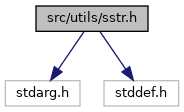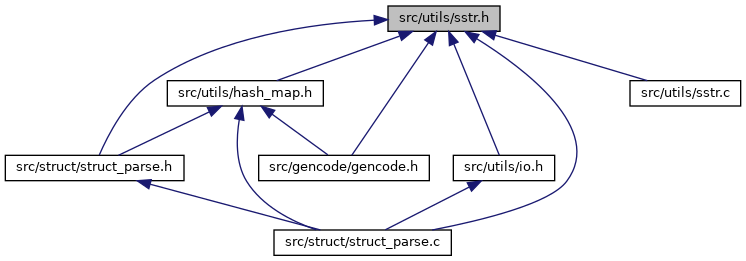sstr_t are objects that represent sequences of characters. More...
#include <stdarg.h>#include <stddef.h>#include <stdbool.h>

Go to the source code of this file.
Classes | |
| struct | sstr_s |
Macros | |
| #define | SHORT_STR_CAPACITY 25 |
| #define | CAP_ADD_DELTA 256 |
| #define | SSTR_TYPE_SHORT 0 |
| #define | SSTR_TYPE_LONG 1 |
| #define | SSTR_TYPE_REF 2 |
| #define | sstr_length(s) ((struct sstr_s*)s)->length |
| Return the length of s, in terms of bytes. | |
| #define | sstr_append_cstr_if(dst, src, cond) sstr_append_of_if(dst, src, strlen(src), cond) |
| Append C style string if cond is true, otherwise do nothing. | |
Typedefs | |
| typedef void * | sstr_t |
| sstr_t are objects that represent sequences of characters. | |
Functions | |
| sstr_t | sstr_new (void) |
| Create an empty sstr_t. | |
| void | sstr_free (sstr_t s) |
| delete a sstr_t. | |
| sstr_t | sstr_of (const void *data, size_t length) |
| Create a sstr_t from data with length bytes. | |
| sstr_t | sstr_ref (const void *data, size_t length) |
| Create a sstr_t from data with length bytes. The data is not copied, but have a pointer to data. | |
| sstr_t | sstr (const char *cstr) |
| Create a sstr_t from C-style (NULL-terminated) string str. | |
| char * | sstr_cstr (sstr_t s) |
| Return C-style string representation of s. | |
| int | sstr_compare (sstr_t a, sstr_t b) |
| Compare a and b return 0 if equal, <0 if a < b, >0 if a > b. | |
| int | sstr_compare_c (sstr_t a, const char *b) |
| compare sstr_t a and c-style string b | |
| void | sstr_append_zero (sstr_t s, size_t length) |
| Extends the sstr_t by appending additional '\0' characters at the end of its current value. | |
| void | sstr_append_of (sstr_t s, const void *data, size_t length) |
| Extends the sstr_t by appending additional characters in data with length of length at the end of its current value . | |
| void | sstr_append (sstr_t dst, sstr_t src) |
| Extends the sstr_t by appending additional characters contained in src. | |
| void | sstr_append_cstr (sstr_t dst, const char *src) |
| Extends the sstr_t by appending additional characters contained in src. | |
| sstr_t | sstr_dup (sstr_t s) |
| Duplicate s and return. | |
| sstr_t | sstr_substr (sstr_t s, size_t index, size_t len) |
| Get substring of s starting at index with length bytes. | |
| void | sstr_clear (sstr_t s) |
| clear the sstr_t. After this call, the sstr_t is empty. | |
| sstr_t | sstr_vslprintf (const char *fmt, va_list args) |
| Printf implement. | |
| sstr_t | sstr_vslprintf_append (sstr_t buf, const char *fmt, va_list args) |
| Same as sstr_vslprintf, but print to buf instead of create a new one. | |
| sstr_t | sstr_printf (const char *fmt,...) |
| printf implement. | |
| sstr_t | sstr_printf_append (sstr_t buf, const char *fmt,...) |
| Same as sstr_printf(), but but print to buf instead of create a new one. | |
| void | sstr_append_int_str (sstr_t s, int i) |
| convert sstr <-> int,long,float,double | |
| int | sstr_parse_long (sstr_t s, long *v) |
| int | sstr_parse_int (sstr_t *s, int *v) |
| void | sstr_append_long_str (sstr_t s, long l) |
| void | sstr_append_float_str (sstr_t s, float f, int precission) |
| void | sstr_append_double_str (sstr_t s, double f, int precision) |
| int | sstr_parse_double (sstr_t s, double *v) |
| void | sstr_append_of_if (sstr_t s, const void *data, size_t length, bool cond) |
| Append if cond is true, otherwise do nothing. | |
| int | sstr_json_escape_string_append (sstr_t out, sstr_t in) |
| void | sstr_append_indent (sstr_t s, size_t indent) |
| append spaces at the end of the sstr_t. | |
| const char * | sstr_version (void) |
| return version string. | |
Detailed Description
sstr_t are objects that represent sequences of characters.
The standard C style string is a sequence of characters terminated by a null character, which is easy to cause buffer overflow. And it's annoying to pass pointer and length of string to every whare.
The sequence of characters just like a string in C++, inside the sstr_t struct, it also has a null character at the end, so that we can use sstr_t as a C style string.
sstr_t contains a pointer to char sequence and its length, solves the security problems of standard C string. With functions bundle with sstr_t, you can easily manipulate the string just like standard C string, but in a safer way:
sstr_t stotal = sstr_new();
sstr_t s1 = sstr("hello");
sstr_t s2 = sstr("world");
sstr_append(stotal, s1);
sstr_append_of(stotal, " ", 1);
sstr_append(stotal, s2);
sstr_free(s1);
sstr_free(s2);
sstr_t result = sstr_printf("stotal=%S, c-str=%s, int=%d, long=%ld",
stotal, stotal, 123, (long)456);
puts(sstr_cstr(result));
sstr_free(result);
sstr_free(stotal);
Macro Definition Documentation
◆ sstr_append_cstr_if
| #define sstr_append_cstr_if | ( | dst, | |
| src, | |||
| cond | |||
| ) | sstr_append_of_if(dst, src, strlen(src), cond) |
Append C style string if cond is true, otherwise do nothing.
- Parameters
-
dst destination sstr_t to append to. src source C-style string to append cond condition
◆ sstr_length
| #define sstr_length | ( | s | ) | ((struct sstr_s*)s)->length |
Return the length of s, in terms of bytes.
This is the number of actual bytes that conform the contents of the sstr_t, which is not necessarily equal to its storage capacity.
Note that sstr_t objects handle bytes without knowledge of the encoding that may eventually be used to encode the characters it contains. Therefore, the value returned may not correspond to the actual number of encoded characters in sequences of multi-byte or variable-length characters (such as UTF-8).
- Parameters
-
s sstr_t instance to get length of.
- Returns
- size_t The number of bytes of s.
Function Documentation
◆ sstr()
|
extern |
Create a sstr_t from C-style (NULL-terminated) string str.
The cstr is copied to the new sstr_t, so you can free cstr after calling this function.
- Parameters
-
cstr C-style string to copy to the result sstr_t.
- Returns
- sstr_t containing data copied from cstr.
◆ sstr_append()
Extends the sstr_t by appending additional characters contained in src.
- Parameters
-
dst destination sstr_t. src source sstr_t.
◆ sstr_append_cstr()
|
extern |
Extends the sstr_t by appending additional characters contained in src.
- Parameters
-
dst destination sstr_t. src source C-style string.
◆ sstr_append_indent()
|
extern |
append spaces at the end of the sstr_t.
- Parameters
-
s the sstr_t to append spaces to. indent numbers of spaces to append.
◆ sstr_append_of()
|
extern |
Extends the sstr_t by appending additional characters in data with length of length at the end of its current value .
- Parameters
-
s destination sstr_t. data data to append. length length of data.
◆ sstr_append_of_if()
|
extern |
Append if cond is true, otherwise do nothing.
- Parameters
-
s the sstr_t to append to. data data to append. length length of data. cond condition
◆ sstr_append_zero()
|
extern |
Extends the sstr_t by appending additional '\0' characters at the end of its current value.
- Parameters
-
s destination sstr_t. length length of '\0' to append.
◆ sstr_clear()
|
extern |
clear the sstr_t. After this call, the sstr_t is empty.
- Parameters
-
s sstr_t instance to clear.
◆ sstr_compare()
Compare a and b return 0 if equal, <0 if a < b, >0 if a > b.
- Parameters
-
a sstr_t to be compared. b sstr_t to be compared to.
- Returns
- int the compare result.
- 0 They compare equal.
- <0 Either the value of the first character that does not match is lower in the compared string, or all compared characters match but the compared string is shorter.
- >0 Either the value of the first character that does not match is greater in the compared string, or all compared characters match but the compared string is longer.
- Note
- This function is case sensitive.
◆ sstr_compare_c()
|
extern |
compare sstr_t a and c-style string b
just like sstr_compare, but compare a and c-style string b.
- Returns
- int
◆ sstr_cstr()
|
extern |
Return C-style string representation of s.
This function return a pointer to the internal C-style string, it has a null-terminal character at the end. So you can use it as a C-style string. The returned pointer is valid until sstr_free()/sstr_append()/sstr_append_of() or any functions that may modify the contents of sstr_t is called.
- Parameters
-
s sstr_t instance to convert to C-style string.
- Returns
- char* C-style string representation of s.
- Note
- The returned string is reused by s, do not free it yourself.
◆ sstr_dup()
Duplicate s and return.
- Parameters
-
s sstr_t to duplicate.
- Returns
- sstr_t duplicate of s.
◆ sstr_free()
|
extern |
delete a sstr_t.
- Parameters
-
s sstr_t instance to delete.
◆ sstr_new()
|
extern |
Create an empty sstr_t.
- Returns
- sstr_t
◆ sstr_of()
|
extern |
Create a sstr_t from data with length bytes.
The data is copied to the new sstr_t, so you can free data after calling this function.
- Parameters
-
data data to copy to the result sstr_t. length length of data.
- Returns
- sstr_t containing data copied from data.
◆ sstr_printf()
|
extern |
printf implement.
- Parameters
-
fmt format, like C printf() ... arguments, like C printf()
- Returns
- sstr_t result string.
◆ sstr_printf_append()
Same as sstr_printf(), but but print to buf instead of create a new one.
- Parameters
-
buf buffer to print to. fmt format string. ... arguments.
- Returns
- sstr_t the result string.
◆ sstr_ref()
|
extern |
Create a sstr_t from data with length bytes. The data is not copied, but have a pointer to data.
- Parameters
-
data data of the result sstr_t. length length of data.
- Returns
- sstr_t
- Note
- The result sstr_t does not own data, but have a pointer to data. It is a reference, not a copy.
- You cannot append a sstr_ref() result.
◆ sstr_substr()
Get substring of s starting at index with length bytes.
- Parameters
-
s sstr_t instance to get substring of. index index of the first byte of the substring. len number of bytes of the substring.
- Returns
- sstr_t substring of s. if index is out of range, return an empty string.
◆ sstr_version()
|
extern |
return version string.
- Returns
- const char* static version string.
◆ sstr_vslprintf()
|
extern |
Printf implement.
supported formats:
- %[0][width]T time_t
- %[0][width][u][x|X]z ssize_t/size_t
- %[0][width][u][x|X]d int/u_int
- %[0][width][u][x|X]l long
- %[0][width][u][x|X]D int32_t/uint32_t
- %[0][width][u][x|X]L int64_t/uint64_t
- %[0][width][.width]f double, max valid number fits to %18.15f
- p void *
- %[x|X]S sstr_t, if x, print as hexadecimal
- s null-terminated string
- %*s length and string
- Z '\0'
- N '
' - c char
- %% %
reserved:
- C wchar
if u/x/X, tailing d can be ignore
